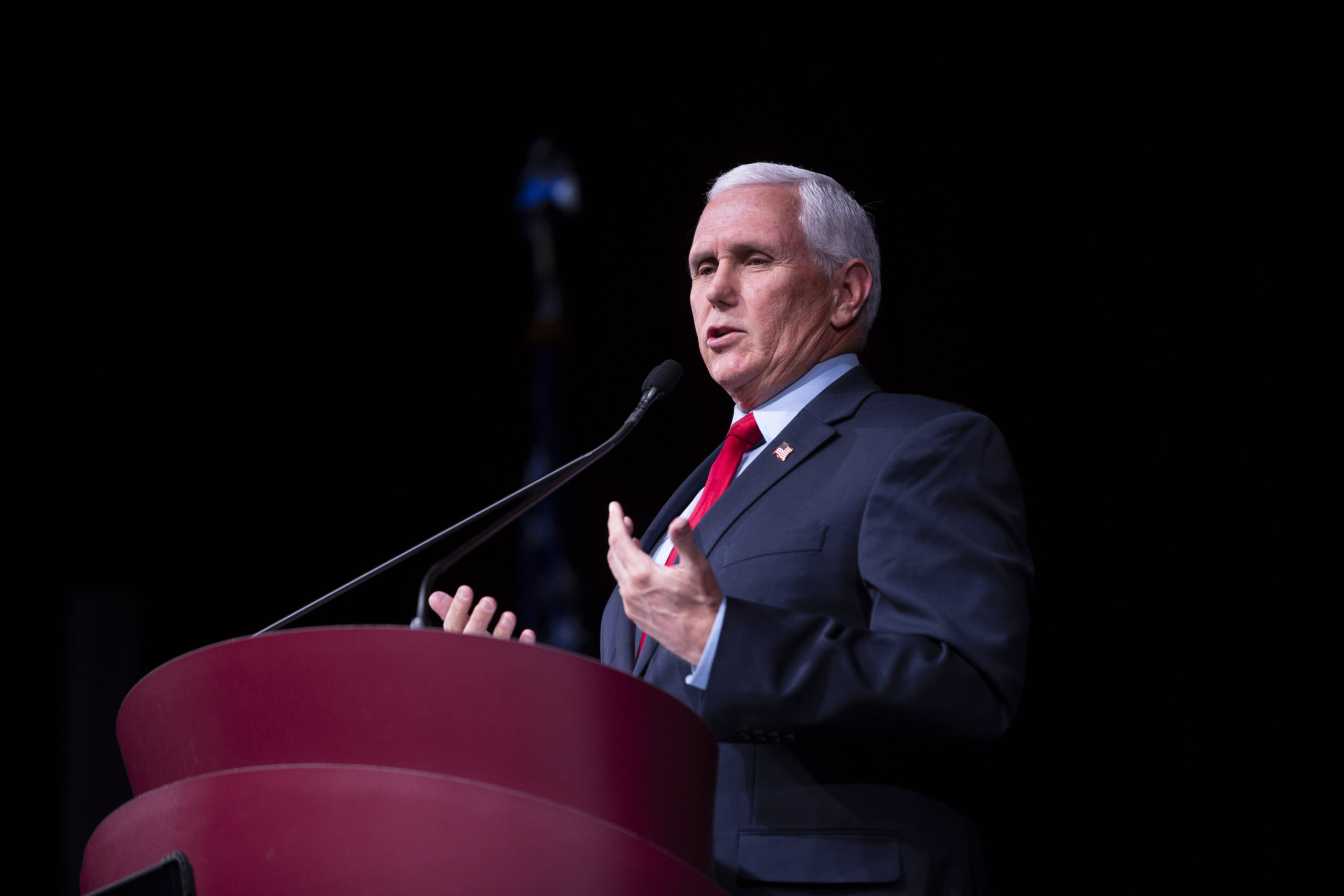The increasing likelihood of an attack in the U.S. should make us consider how we will answer.
“No Room” for “Apologists for Putin” in Pence’s Exclusive Club GOP

Demonizing war skeptics is wrong and wrongheaded.
“There is no room in this party for apologists for Putin,” intoned former Vice President Mike Pence, to applause from donors at a recent Republican event. “There is only room for champions of freedom.” Thus did he criticize everyone who isn’t all in against Russia, apparently including his old boss Donald Trump.
As CNN pointed out, Pence was likely referring to the fact that Trump had recently called Vladimir Putin a “genius” and “savvy” for launching his invasion of Ukraine at an opportune moment of weakness in the West. “Putin only understands strength,” continued Pence. “As members of the party that won the Cold War, we must send a deafening message: Putin must stop or Putin must pay.”
This “deafening message,” he explained, should be transmitted by increasing military spending, arming Ukraine with lethal weapons, and sanctioning “all Russian oil exports worldwide.” How will such sanctions be enforced? How much are Americans expected to pay for the West’s retaliations? What else is required if these measures are ineffective? Pence didn’t say.
Although Trump’s “genius” and “savvy” may not have aged well as descriptions of Putin, Trump is hardly an apologist for Putin, whatever Pence meant by that lazy epithet. Nor does the epithet apply fairly to anyone who suggests that Biden’s mix of weak policy and antagonistic behavior may have driven Putin to strike. Most people think America should support Ukrainians, though not in an unlimited fashion, as they suffer undeservedly under Russia’s assault. Reasonable minds can disagree about the limits, and the GOP should encourage its members to engage in that disagreement. Even Pence would presumably concede that nuking Moscow would be too “deafening.”
Technically, it’s impossible to disagree with “Putin must stop or Putin must pay,” because it’s impossible to know what Pence meant by his “deafening message.” That’s one problem with slogans serving as policy. Another problem, with this one in particular, is the risk of unintended consequences, like escalation to world war or the risk of lesser disasters like Afghanistan, Iraq, and Libya. A patriotic conservative should be able to express misgivings about unbounded opposition to Putin without fear of being labeled an apologist for him. (By the way, do you too suspect that people sometimes use “apologist” when they mean “appeaser”? Let’s assume Pence knows the difference. Also by the way, did Pence really mean “stop or pay”? Wouldn’t “stop and pay” have been less transactional in its ethics? We need to report Pence to himself for a good public scolding.)
Pence may see it differently, based on his speech. There, he seemed to say: “Non-interventionists, libertarians, those who want to take the afternoon off for a second think before starting a world war—you all need not apply; off you go to your pal in the Kremlin.”
We disagree. Club GOP doesn’t need an ideological bouncer at its door. If Pence is nonetheless applying for the job, he shouldn’t dress up his résumé with the moralizing belligerency of certain members of the party who have so often led us astray in foreign lands.
As to those members, how can we get them to stop and pay for their misadventures? Pence should pause from “deafening” us to deliver this merely audible message to Lindsay Graham: It’s one thing for opinionators to daydream about the Putin problem magically going away, but it’s another thing for the senior senator from South Carolina to call for the assassination of a foreign head of state. If only Graham himself had to “pay” for such folly.
“We don’t want your kind around here” is a bad strategy for Pence to recommend. Pence was elected VP only because Trump had a better strategy: let’s get more votes from more people. Moreover, why is Pence so keen on this one issue as a criterion for party membership? While Putin may be a big issue for him, is it a bigger issue than, say, abortion? Probably not, based on his history of strong opposition to abortion. He is, of course, entitled to his views, but it would be unwise for a senior party member to thunder that there is no room in his party for anyone who doesn’t share, to the letter, his opinion on that subject.
Or, to bring it back to foreign policy, there are lots of Republicans who, by the Pence standard, could be said to be “apologists for China.” Even conservatives can see the reality of the economic progress made by the Chinese over the past several decades. What if, even in displeasure, one of them were to remark on that? Is there room for that in Pence’s party, or is that forbidden Sinapologism?
Republicans should be intolerant of intolerance like Pence’s. They should want to keep the party tent big enough for interesting discussions and large electoral majorities. They should warn Pence and his fellow purists that there is no room in the party for would-be leaders who demand ideological purity. Although Trotskyites may squabble with Maoists over details, ideological purity is much more of a leftist thing, anyway. Practical conservatives should stay out of that room.
The American Mind presents a range of perspectives. Views are writers’ own and do not necessarily represent those of The Claremont Institute.
The American Mind is a publication of the Claremont Institute, a non-profit 501(c)(3) organization, dedicated to restoring the principles of the American Founding to their rightful, preeminent authority in our national life. Interested in supporting our work? Gifts to the Claremont Institute are tax-deductible.
Saddling conservatives with the color of communist tyranny is repugnant.
If California’s conservative vote went elsewhere, it could make a real difference.
Like a parody disaster movie, but real.
The Washington establishment works to maintain the status quo.
The Republican Old Guard needs to adopt new tactics to deal with a rapidly changing society.






